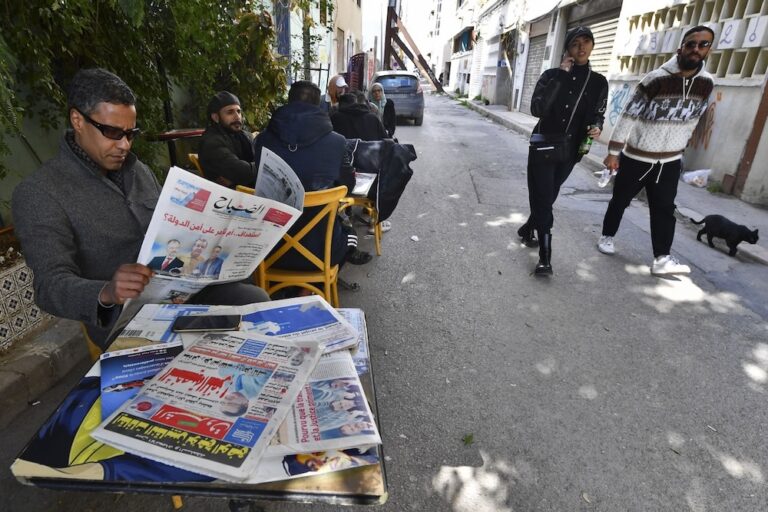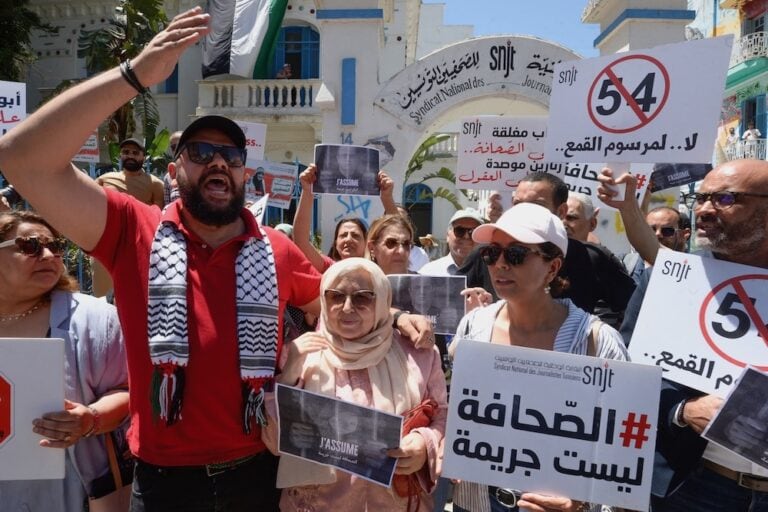Finally freed from 18 Years of prison and internal exile, Abdallah Zouari still under tight surveillance (Human Rights Watch/IFEX) – New York, September 18, 2009 – The Tunisian government should end the harassment of the human rights activist and journalist Abdallah Zouari immediately, Human Rights Watch said today. Zouari, who was imprisoned for 11 years, […]
Finally freed from 18 Years of prison and internal exile, Abdallah Zouari still under tight surveillance
(Human Rights Watch/IFEX) – New York, September 18, 2009 – The Tunisian government should end the harassment of the human rights activist and journalist Abdallah Zouari immediately, Human Rights Watch said today.
Zouari, who was imprisoned for 11 years, then forced to spend seven more in a remote village, was again arrested on September 15, 2009, threatened, and held for the day. It was one of a series of recent episodes that indicate he is still under surveillance, though his exile formally ended a month ago.
“The Tunisian authorities say they have lifted the travel restrictions on Zouari, but the police are still trailing him and doing everything they can to impede his human rights activities,” said Sarah Leah Whitson, Middle East and North Africa director at Human Rights Watch.
Police in plainclothes arrested Zouari at about 1 p.m. on September 15 in front of a post office in Hassi Djerbi, the village in southern Tunisia where he was sent in exile. He had gone to the post office to mail a complaint to the minister of interior about unrelenting surveillance by state security agents. The police took him to their station in Zarzis, where they questioned him about his activist work, including his contact with human rights organizations and his journalistic work over the past seven years, Zouari told Human Rights Watch.
The police told him to sign an affidavit saying he would not write articles that “defame the state and threaten its security.” He refused. Then they threatened that if he did not stop his journalistic and human rights activities, they would release a film purporting to show him engaged in sexual activity. The police also insulted him repeatedly and threatened physical violence. They released him at 10 p.m. without charge.
The arrest followed his release of a statement on September 13, describing how a police vehicle followed him for about 9 kilometers earlier that day from Zarzis to Hassi Djerbi and then blocked the road to his house. He said that Police Chief Fathi Ibrahim then demanded that Zouari accompany him to the police station for questioning. Zouari said that he refused because Ibrahim did not present a summons, as required by Tunisian law.
Zouari has been subject to repeated harassment and intimidation by police since he completed an 11-year prison sentence in June 2002. The original sentence included an additional five years of post-release “administrative control,” which authorities implemented by requiring him to live in a remote village far from his home near the capital. In June 2007, when the control was due to end, authorities orally extended Zouari’s effective confinement to this village by 26 months without providing a legal basis for doing so.
This extension expired on August 5, but Tunisian police have continued to monitor Zouari closely, continuing to station cars with plainclothes agents outside his residence and following him whenever he leaves his house.
Human rights activists in Tunisia have long been a target of government repression. They are routinely detained without charge, subjected to arbitrary travel restrictions and constant surveillance, prevented from meeting and carrying out their work, and, in some cases, physically assaulted.
Zouari was first arrested in 1991 as part of a major crackdown by authorities after they outlawed the Islamist Al-Nahdha party. At the time, he was a journalist with Al-Fajr, an organ of the party. He was convicted of “membership in an illegal organization” and “attempting to overthrow the state” and sentenced to the 11-year prison term.
The mass trial in which he was convicted did not meet international standards guaranteeing fair and impartial proceedings, as Human Rights Watch and other organizations have previously reported. Abuses included extracting confessions under torture, denial of appeal, and close surveillance and restriction of trial monitors.
Since his release in 2002, Zouari has been a continuing source of information about the plight of political prisoners and the human rights situation in the southern region where authorities confined him.
Zouari is not the first human rights activist whom the authorities threatened with circulating images purporting to show the activist engaged in sexual acts. In 1993, fake pornographic photographs depicting the Tunis-based journalist and activist Sihem Ben Sedrine began circulating, an apparent effort to smear her reputation and detract from her human rights work.
“If President Zine el-Abidine Ben Ali wants the October 25 presidential elections to appear as something more than the hollow exercise it has been in the past, he should ensure an end to this intensive police harassment of those who, like Zouari, dare to criticize openly the government’s practices,” said Whitson.


